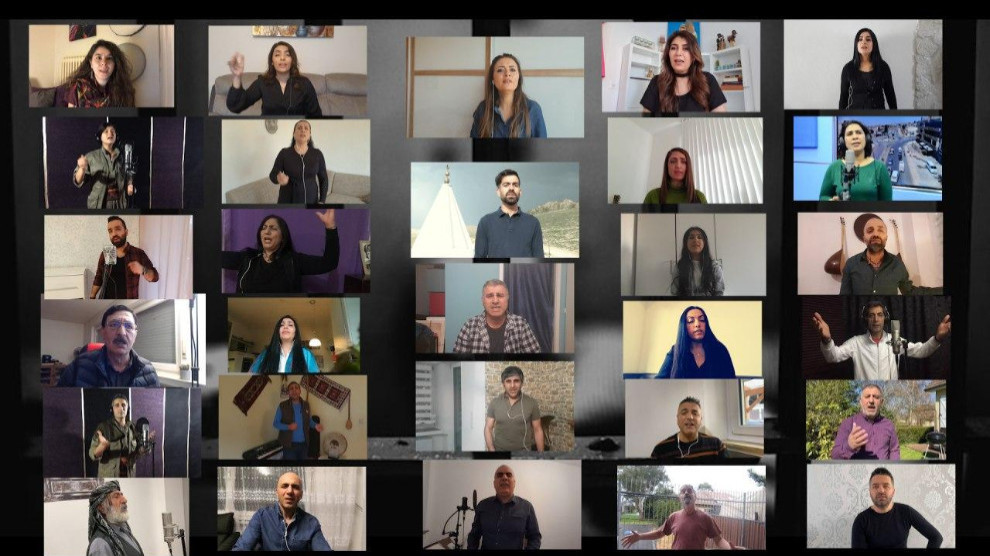Kurdish musicians sing for political prisoners in Turkey
As a sign of solidarity with the political prisoners in Turkey, 46 Kurdish musicians recorded a new version of the resistance song "Zindana Diyarbekîr".
As a sign of solidarity with the political prisoners in Turkey, 46 Kurdish musicians recorded a new version of the resistance song "Zindana Diyarbekîr".

As a sign of solidarity with the political prisoners in Turkish prisons and the struggles for prisoners' rights, 46 Kurdish musicians recorded a new version of the resistance song "Zindana Diyarbekîr" (also Zindana Amedê, Prison of Diyarbakir). The song first appeared in the 1980s, when Kurdish prisoners were tortured to death in "Hell No. 5", as the prison was also called, and was written by the band Koma Agirî from Rojava.
The joint project, which was launched on the initiative of the Kurdish music channel MED Music, stands as support for the legitimate demands of the political prisoners and their relatives. "Particularly in view of the fact that Abdullah Öcalan has been held in solitary confinement for 21 years, and in view of the fact that the Turkish government has now introduced its bill, known as the Corona Amnesty, into parliament, which excludes political prisoners from improvements in prison conditions, it was important for us to send out a signal. We as Kurdish artists have the duty to make the voice of the people heard," said Merdan Zirav, TV coordinator of MED Music.
Before that, dozens of Kurdish artists had created the Kurdish version of the Italian partisan song "Bella Ciao". People from all four parts of Kurdistan took part in the project to show solidarity with Italy. Italy is the country most affected by the Corona pandemic worldwide.
Collective projects important for cohesion
"Collective projects like these are important for interpersonal cohesion, especially in times of pandemics that isolate us from others," said Zirav. The musician also announced a third project. This time for the people of Rojhilat (Eastern Kurdistan/Iran).
The participating musicians are: Merdan Zirav, Xemgîn Bîrhat, Vîyan Awazê Çiya, Nesrîn, Cömerd, Önder Deniz, Xanemîr, Zozan Zûdem, Yeşim İncedursun, Bengî Agirî, Tîtal, Xelîl Xemgîn, Tülay, Seer Stran, Roj, Nuarîn, Arya Şahin, Fehed Şengalî, Serhat Awazê Çiya, Ali Gecimli, Jîyan Arjîn, Rojînda, Deniz Deman, Sîpan Xelat, Farqîn Azad, Ronî Erez, Zeyno Durar, Nûdem, Berfîn Mamedova, Berbag, Mordem Awazê Çiya, Ciwan Ayaz, Delîl Awazê Çiya, Hogir Göregen, Nurullah, Memet Taş, Sultan, Lewend Yûsiv, Hozan Derwîş, Merdan Zirav, Mazlum Rewşen, Murat Bakrak, Nure Dilovan, Sefkan, Emrah Öztürk, Memo Yapıştıran and Dilvan Ronî.
Zindana Amedê
For the Kurdish liberation movement, the prison of Diyarbakir is a synonym for torture and resistance. The prison was built in 1980 by the Turkish Ministry of Justice as an E type prison and handed over to the junta on the day of the military coup on September 12. As a military prison under martial law, it achieved a high level of security through brutal torture methods such as systematic beatings, electric shocks (in which special electrodes were attached to the genitals), sexual torture, rape, disco (bathing in faeces), sleep, food and water deprivation for long periods of time, exercises under extreme temperatures, squeezing and stretching of body parts and genitals, burning with cigarettes and tearing out hair, nails and teeth.
PKK prisoners were also imprisoned in Amed at that time. Where the resistance against the military junta had been the light in the darkness imposed on the Kurdish people, they entered into a death fast on 14 July 1982 with the demand for an "end to torture, military discipline and uniform clothing". PKK cadres Kemal Pir, Mehmet Hayri Durmuş, Akif Yılmaz and Ali Çiçek lost their lives. As a result of the resistance, the era of Esat Oktay Yıldıran, senior officer of the prison, whose name was synonymous with torture, also ended.
RELATED NEWS: